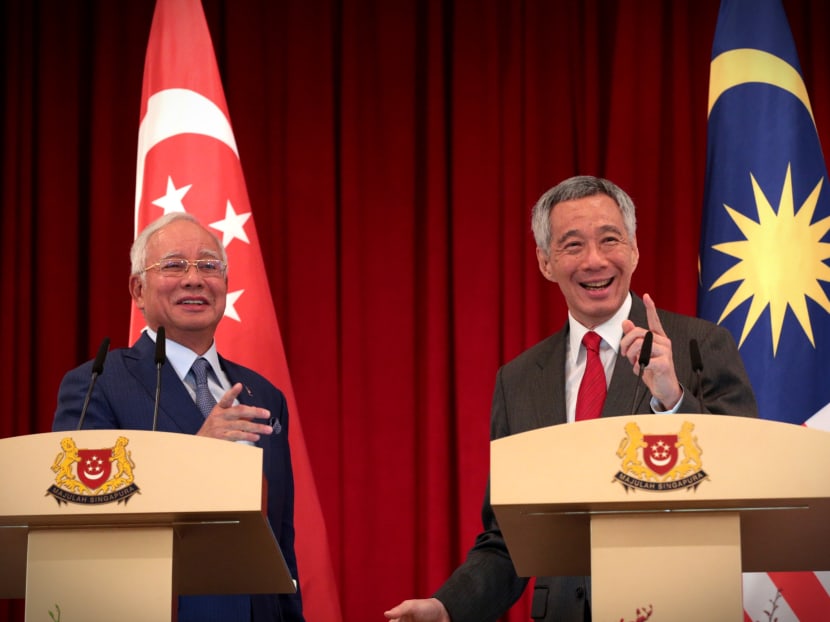No more ‘confrontational diplomacy’ with S’pore, says Najib
SINGAPORE — Malaysian Prime Minister Najib Razak said on Tuesday (Jan 16) that his government has no wish to return to “confrontational diplomacy and barbed rhetoric” between Singapore and Malaysia, and both countries want to put that bygone era behind them.

Prime Minister Lee Hsien Long and Malaysia's Prime Minister Najib Razak attended a joint press conference at the Istana. Photo: Jason Quah/TODAY
SINGAPORE — Malaysian Prime Minister Najib Razak said on Tuesday (Jan 16) that his government has no wish to return to “confrontational diplomacy and barbed rhetoric” between Singapore and Malaysia, and both countries want to put that bygone era behind them.
“The other side may have other ideas. We certainly do not want to return to the era of confrontational diplomacy and barbed rhetoric between our two countries. It was an era that we want to forget,” said Mr Najib, alluding to Malaysia’s Opposition which will be led by former Malaysian Prime Minister Mahathir Mohamad, 92, in the country’s coming General Election.
Adding that his government cannot determine how the electorate will vote, Mr Najib said: “But we believe that they’ll decide on an agenda that is very meaningful and productive. And we believe in good relations with our neighbour, with Singapore, and we’ve proved that we can bring tangible benefits to the people if we work closely.”
Mr Najib, who is in Singapore for an annual retreat with Prime Minister Lee Hsien Loong, was asked during a joint press conference on Tuesday with PM Lee about how the Singapore and Malaysia governments will ensure that long-term bilateral projects — such as the Singapore-Kuala Lumpur High-Speed Rail (HSR) and the Rapid Transit System (RTS) linking Johor Baru and Woodlands — would not be affected by political changes, among other factors.
Earlier this month, Opposition coalition Pakatan Harapan announced that Dr Mahathir, who is its chairman, would be its prime ministerial candidate should it prevail at the polls which will be held in the coming months.
Dr Mahathir, who was Malaysia’s Prime Minister from 1981 to 2003, is known for his often confrontational foreign policy approach.
Last week, Dr Mahathir had levelled fresh accusations against his successor and former prime minister Abdullah Badawi for backtracking on his promises, including cancelling plans to build a “crooked bridge” linking Johor and Singapore.
The so-called “crooked bridge” was Dr Mahathir’s idea to replace the Causeway, but was discontinued by Mr Badawi. In January last year, Dr Mahathir also said the HSR project may not be a done deal if the Opposition takes power, calling out its financial viability as an area that had to be studied.
At Tuesday’s press conference, PM Lee said the bilateral agreement for the RTS — inked by the two countries on the same day as the press conference — was a binding one, which future governments on either side “inherit and which they are party to”. He added: “If a subsequent government has other ideas, that will have to be dealt with, and the agreement will deal with these contingencies. But I have no doubt, on Singapore’s side, we have every intention of implementing what we signed.”
Under the current leaders, ties between Singapore and Malaysia are “at the best level in history”, in the words of Mr Najib in 2015. This is in contrast to the earlier decades — including under Dr Mahathir’s premiership — when the two sides had frequent clashes, which at times prompted Malaysia to publicly threaten to cut off its water supply to the Republic.
Nevertheless, Dr Mahathir told The Straits Times in January last year that Singapore should not worry about ties with Malaysia if Mr Najib lost the election.
Dr Mahathir pointed out that the two countries moved forward on some issues during his premiership, despite the perception that he had a fraught relationship with Singapore’s late founding Prime Minister Lee Kuan Yew.
In his memoirs, Mr Lee acknowledged that he made more progress resolving bilateral issues with Malaysia under Dr Mahathir’s premiership than with his two predecessors. Nevertheless, relations had soured at certain points.
After several months of negotiations between the two countries, a Points of Agreement (POA) was signed on Nov 27, 1990 — the day before Mr Lee stepped down.
Under the pact, the two countries agreed on the joint development of three main parcels of land at Tanjong Pagar, Kranji and Woodlands, with Malaysia having a 60 per cent share and Singapore 40 per cent. Three years later, however, Malaysia said the agreement was unfair as it did not include a piece of railway land at Bukit Timah for joint development.
And despite Dr Mahathir confirming that Malaysia would move its Customs, Immigration and Quarantine post to Woodlands in April 1992, Malaysia decided in June 1997 to retain its facility at Tanjong Pagar.
It was only in 2010 that PM Lee and Mr Najib ended the impasse, when they finally managed to settle the outstanding issues of the POA, including moving the Malaysian Railway station from Tanjong Pagar to the Woodlands Checkpoint in July 2011.








